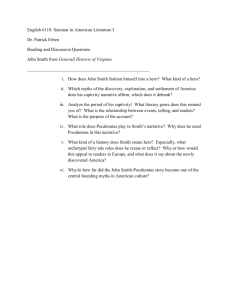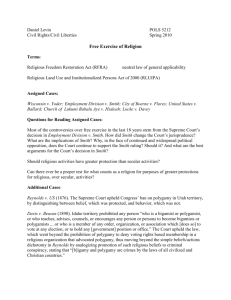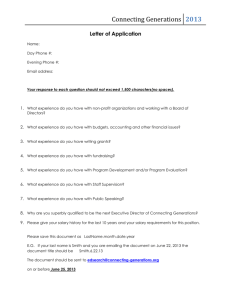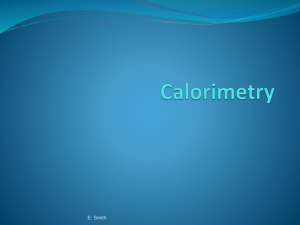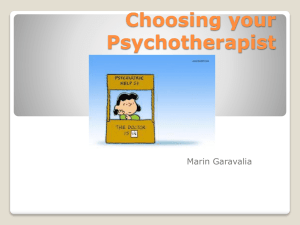Syllabus-EU-as-global-actor-fall-2013
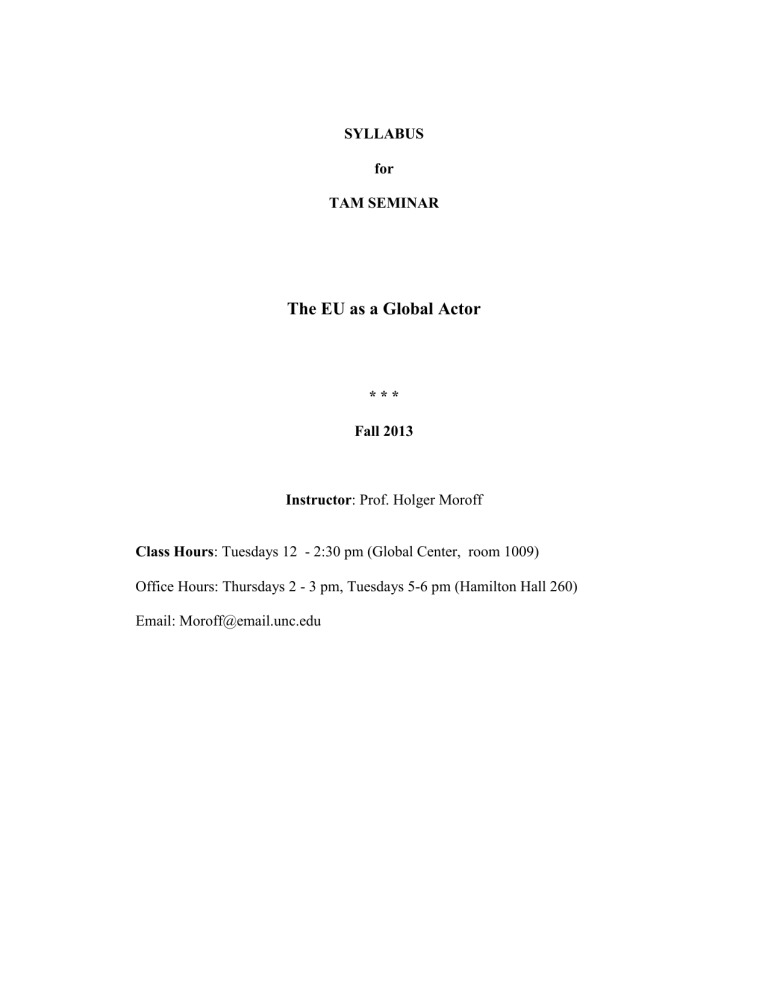
SYLLABUS for
TAM SEMINAR
The EU as a Global Actor
* * *
Fall 2013
Instructor : Prof. Holger Moroff
Class Hours : Tuesdays 12 - 2:30 pm (Global Center, room 1009)
Office Hours: Thursdays 2 - 3 pm, Tuesdays 5-6 pm (Hamilton Hall 260)
Email: Moroff@email.unc.edu
I. COURSE DESCRIPTION
This seminar introduces students to basic theoretical approaches to both International Relations and the European Union by focusing on the EU's external relations and foreign policies. The EU is not a classical actor in international relations as it enjoys more decision making powers than an international organization and less than a unitary state. However, these powers vary according to the degree of integration in different policy fields. How have political scientists conceptualized
European integration as participating in and changing international relations? How have they explained the development of supranational institutions and decision making in external relations? There are few areas of agreement on these questions, and we shall have the opportunity to compare and contrast the answers that political scientists have provided. In a second step we shall look at the institutional set up of the EU’s external relations and analyze a diverse set of EU external policies ranging from trade and soft security issues to diplomatic and military developments as well as taking a closer look at US-EU relations.
II. EXAMINATIONS AND ASSIGNMENTS
1) One of the following a) Three short papers (25% each) which briefly outline and critique or take up one particular aspect of the readings for one class session. You may select any session, though one paper must be written on sessions II through V, one on sessions VI through X and one on sessions XI through XV. You may write 1200 to 1400 words (please note the number of words on your paper). Papers must be send by email a day before class (until 4 pm) for that session’s reading. Late papers will be penalized. Papers should be written by individual authors, but they may be based on collective discussions and ideas.
OR b) A research paper (75%) on a topic related to the course. Please come and talk to me about your topic. The paper should be article-length (about 4500 words) and involve some original research. You are encouraged to write on your thesis topic but any theme relating to the course topic is fine. A first full version of the paper must be handed in by Sunday, November
24 th (use Sakai forum). The final version is due December 9 th
(use Sakai digital drop box).
2) One in-class presentation (15%) The presentation is about 30 minutes in total. Circulate copies of a handout on your topic (one page single-spaced, or two pages double-spaced, including graphs and tables) to all students in the class prior to your presentation.
3) Participation in class discussion will count for 10%. You should prepare two questions on substantial points of the required reading for each class. Please don’t pursue the “rational” strategy of reading only for sessions for which you write a paper or lead the discussion. For current EU and US affairs you should read The Economist’s coverage on Europe and the US
(free full content is available online through UNC).
2
III. BOOKS
Required:
Christopher Hill, Michael Smith (eds), International Relations and the European Union , 2 nd edition, Oxford University Press, 2011.
Recommended:
John McCormick, Understanding the European Union , 5 th
edition , Palgrave/Westview Press,
2011.
Walter Carlsnaes et al. (eds.), Handbook of International Relations, Sage, 2005 (selected chapters).
Helen Wallace, William Wallace, Mark Pollack (eds), Policy-Making in the European Union ,
Oxford UP, 6 th
edition 2010 (selected chapters).
Walter Carlsnaes, Helene Sjursen, and Brian White (eds), Contemporary European Foreign
Policy , London, Thousands Oaks, New Dehli: SAGE Publications 2004.
Charlotte Bretherton and John Vogler, The European Union as a Global
Actor . London, New York: Routledge, 2006.
3
I. (20 August) Introduction and Organization
II. (27August) The EU – a special case of international relations or a special actor in international relations?
Required Reading:
International Relations and the European Union: Themes and Issues (Hill/Smith in Hill/Smith), chapter 1, pp. 3-20.
Foreign Policies (manuscript by Simon Hix on Blackboard)
Additional Reading:
Ginsberg, Roy H. 1999. “Conceptualizing the European Union as an International Actor:
Narrowing the Theoretical Capability-Expectations Gap”, Journal of Common Market Studies
37:3. 429-54.
Tonra, Ben. 2006. “Conceptualizing the European Union’s Global Role”, in Palgrave Advances in European Union Studies , eds. Michelle Cini and Angela K. Bourne. Houndmills, Basingstoke,
Hampshire: Palgrave Macmillan. 117-30.
Roy Ginsberg, The European Union in International Politics: Baptism by Fire , Lnham: Rowman and Littlefield, 2001.
III (3 September) What is so special about EU policy making?
Required Reading:
Theorizing EU Policy-Making (Pollack in Wallace/Wallace/Pollack 2005), chapter 2 pp. 13-47.
Additional Reading:
Ben Rosamond. 2000. Theories of European Integration.
London: MacMillan Press, chapter 7, pp. 157-186.
Liesbet Hooghe and Gary Marks. 2001. Multi-level Governance and European Integration ,
Rowman & Littlefield, Chapter 1.
IV (10 September)
How can the EU’s international relations be conceptualized?
4
Required Reading:
Theory and the EU’s International Relations (Andreatta in Hill/Smith ) , chapter 2, pp. 21-343.
History of International Relations, Handbook of IR ch. 1 pp. 3-22
Additional Reading:
Smith, Michael E. 2004. “Toward a Theory of EU Foreign Policy-Making: Multi-Level
Governance, Domestic Politics, and National Adaptation to Europe’s Common Foreign and
Security Policy”, Journal of European Public Policy 11:4. 740-58.
Richard Cooper. 2003. The Breaking of Nations: Order and Chaos in the Twenty-First Century ,
New York: Atlantic Monthly Press.
V (17 September) What external policies is the EU actually conducting?
Required Reading:
The Pattern of the EU’s Global Activity
(Edwards in Hill/Smith ), chapter 3, pp. 44-71.
The EU's Security and Defense Policy: Towards a Strategic Approach (Howorth in Hill/Smith), chapter 9.
Additional Reading:
Manners, Ian. 2006. “Normative Power Europe Reconsidered: Beyond the Crossroads”,
Journal of European Public Policy 13:2. 182-99.
Tonra, Ben. 2006. “Conceptualizing the European Union’s Global Role”, in
Palgrave Advances in European Union Studies , eds. Michelle Cini and Angela K. Bourne. Houndmills, Basingstoke,
Hampshire: Palgrave Macmillan. 117-30.
VI (24 September) The grammar of external relations: Institutional structures and intricacies
Required Reading:
The Institutional Framework (Vanhoonacke in Hill/Smith), chapter 4, pp. 75-100.
Knud Erik Jorgensen, “Making CFSP Work,” in John Peterson and Michael
5
Shackleton, eds., The Institutions of the European Union (Oxford, 2002), ch.10
Additional Reading:
John Peterson and Michael E. Smith, “The EU as a Global Actor,” in Elizabeth
Bomberg and Alexander Stubb, eds., The European Union: How Does It Work?
(Oxford, 2003), ch.10
VII (1 October) Social Science and Theories of International Relations
Required Reading:
Philosophy of Social Science and IR, Handbook of IR ch. 2 pp. 23-51
Rationalism v. Constructivism, Handbook of IR ch. 3 pp. 52-72
Additional Reading:
Constructivism and IR, Handbook of IR ch. 5 pp. 95-118
VIII (8 October) 27 into 1 or 27 + X: Is the EU a collective actor or a diplomatic club?
Required Reading:
Coherence (Gebhard in Hill/Smith), chapter 5, pp. 101-127.
Foreign Policy Analysis, Handbook of IR ch. 17 pp. 331-349
Additional Reading:
Tonra, Ben. 2006. “Conceptualizing the European Union’s Global Role”, in
Palgrave Advances in European Union Studies , eds. Michelle Cini and Angela K. Bourne. Houndmills, Basingstoke,
Hampshire: Palgrave Macmillan. 117-30.
Bretherton, Charlotte, and John Vogler. 2006. Chapter 2: “Nature of the Beast: The Identity and
Roles of the EU”, in Charlotte Bretherton and John Vogler,
The European Union as a Global
Actor . London, New York: Routledge. 37-61.
6
IX (15 October) Europeanization, globalization or back to the state?
Required Reading:
The Europeanization of Foreign Policy (Wong in Hill/Smith), chapter 7, pp. 149-170.
The Challenge of the Environment, Energy, and Climate (Vogler in Hill/Smith, chapter 15.
Additional Reading:
Olsen, J.P. 2002: “The many faces of Europeanization” in: Journal of Common Market Studies
40/5: 921-51.
Hill, Christopher. 2004. “Renationalizing or Regrouping? EU Foreign Policy Since 11
September 2001”, Journal of Common Market Studies 42:1. 143-63.
Michael E. Smith, "Diplomacy by Decree: The Legalization of EU Foreign
Policy," Journal of Common Market Studies, 39:1 (March 2001), 79-104
X (22 October) Structures and actors in the policy process – interlocking or interblocking?
Required Reading:
An Institutional Anatomy and five policy modes (Helen Wallace in Wallace/Wallace/Pollack, chapter3, pp. 77-90, on Blackboard)
Implementation: Making the EU’s International Relations Work (Michael E. Smith in Hill/Smith) chapter 8, pp. 171-194.
The EU and the Developing World: Partnership, Poverty, Politicization (Carbone in
Hill/Smith), chapter 14.
Additional Reading:
Friis, Lykke, and Anna Murphy. 1999. “The European Union and Central and Eastern Europe:
Governance and Boundaries”, Journal of Common Market Studies 37:2. 211-32.
Christiansen, Thomas. 2001. “Intra-institutional Politics and Inter-institutional Relations in the
EU: Towards Coherent Governance?” Journal of European Public Policy 8:5. 747-69.
XI (29 October) Inside out – where is domestic policy foreign and where is foreign policy
7
domestic?
Required Reading:
The External Face of Internal Security (Rees in Hill/Smith), chapter 10, pp. 226-245.
Enlargement and European Order (Karen E. Smith in Hill/Smith), chapter 13, pp. 299-323.
Additional Reading:
Boswell, Christina. 2003. “The ‘External Dimension’ of EU Immigration and Asylum Policy”,
International Affairs 79:3. 619-38.
Frank Schimmelfennig, “The Community trap: liberal norms, rhetorical action, and the eastern enlargement of the European Union,”
International Organization
55:1 (Winter 2002), 47–80
Lavenex, Sandra. 2001. “Migration and the EU’s New Eastern Border: Between Realism and
Liberalism”,
Journal of European Public Policy 8:1. 24-42.
Andrew Moravcsik and Milada Anna Vachudova, “National Interest, State Power, and EU Enlargement,”
East European Politics and Society (February 2003)
XII (5 November) Interdependence and trade – how to negotiate, balancing costs and benefits?
Required Reading:
The EU and the global political economy (Verdun in Hill/Smith), chapter 11, pp. 246-274.
The European Union as a Trade Power (Meunier and Nicoaidis in Hill/Smith), chapter 12, pp.
275-298.
Additional Reading:
Meunier, Sophie, and Kalypso Nicolaïdis. 2006. “The European Union as a Conflicted Trade
Power”,
Journal of European Public Policy 13:6. 906-25.
Comparative Regional Integration, Handbook ch. 25 pp. 480-499
Smith, Michael. 2004. “Foreign Economic Policy”, in Contemporary European Foreign Policy , eds. Walter Carlsnaes, Helene Sjursen, and Brian White. London, Thousands Oaks, New Dehli:
SAGE Publications. 75-90.
8
Woolcock, Stephen. 2005. “Trade Policy”, in
Policy-Making in the European Union , eds. Helen
Wallace, William Wallace, and Mark A. Pollack. Oxford: Oxford University Press. 377-99.
XIII (12 November) The transatlantic partnership in a global perspective
Required Reading:
The EU and the United States (Michael Smith / Steffenson in Hill/Smith), chapter 17, pp. 404-
432.
The European Union, the BRIC, and the new world order (Keukeleire/Bruyninckx in
Hill/Smith), ch. 16, pp. 380-403.
Additional Reading:
Robert Kagan, “Power and Weakness,”
Policy Review 113 (June/July 2002), 3-28
(available at: http://www.policyreview.org/JUN02/kagan.html)
Robert Keohane. 2002. “Ironies of Sovereignty: The European Union and the United States.”
Journal of Common Market Studies 40, 4: 743-65.
Charles Kupchan, “The Rise of Europe, America's Changing Internationalism, and the End of U.S. Primacy,”
Political Science Quarterly 118 (Summer 2003),
205-231
Mark A. Pollack and Gregory C. Shaffer, eds., Transatlantic Governance in the
Global Economy (Rowman & Littlefield, 2001), chs.1 and 11
Thomas Risse-Kappen, “Collective Identity in a Democratic Community: The
Case of NATO,” in Peter Katzenstein, ed., The Culture of National Security
(Columbia, 1996), ch.10
McCormick, 2007, The European Super Power (Basingstoke: Palgrave Macmillan)
XIV (19 November) DEBATE: Enlightened progress or colonialism in disguise? Towards a post-modern foreign policy?
Required Reading:
A European Civilising Process? (Linklater in Hill/Smith), chapter 17, pp. 367-387.
9
Acting for Europe: Reassessing the European Union’s Place in International Relations
(Hill /
Smith in Hill/Smith), chapter 18, pp. 388-406
Mitzen, Jennifer. 2006. “Anchoring Europe’s civilizing identity: habits, capabilities and ontological security”
Journal of European Public Policy 13:2. 270-285.
Additional Reading:
Michael Smith, “The framing of European foreign and security policy: towards a post-modern policy framework,” Journal of European Public Policy 10:4 (2004),
556-575
Mitzen, Jennifer. 2005. “Reading Habermas in Anarchy: Multilateral Diplomacy and Global
Public Spheres”
American Political Science Review 99:3. 401-417.
Manners, Ian. 2002. “Normative Power Europe: A Contradiction in Terms?” Journal of Common
Market Studies 40:2. 235-58.
Manners, Ian. 2006. “Normative Power Europe Reconsidered: Beyond the Crossroads”,
Journal of European Public Policy 13:2. 182-99.
Helen Sjursen. 2004. “Changes to European Securiy in a Communicative Perspective”
Cooperation and Conflict 39:2. 107-128.
Mathias Koenig-Archibugi, “International Governance as New Raison d'État? The
Case of the EU Common Foreign and Security Policy,”
European Journal of
International Relations 10:2 (June 2004), 147-188
Maria Green Cowles, “Non-state actors and false dichotomies: reviewing IR/IPE approaches to European integration,” Journal of European Public Policy 10:1
(February 2003), 102-120
XV (26 November) Discussion of research papers
XVI (3 December) Discussion of research papers
10

